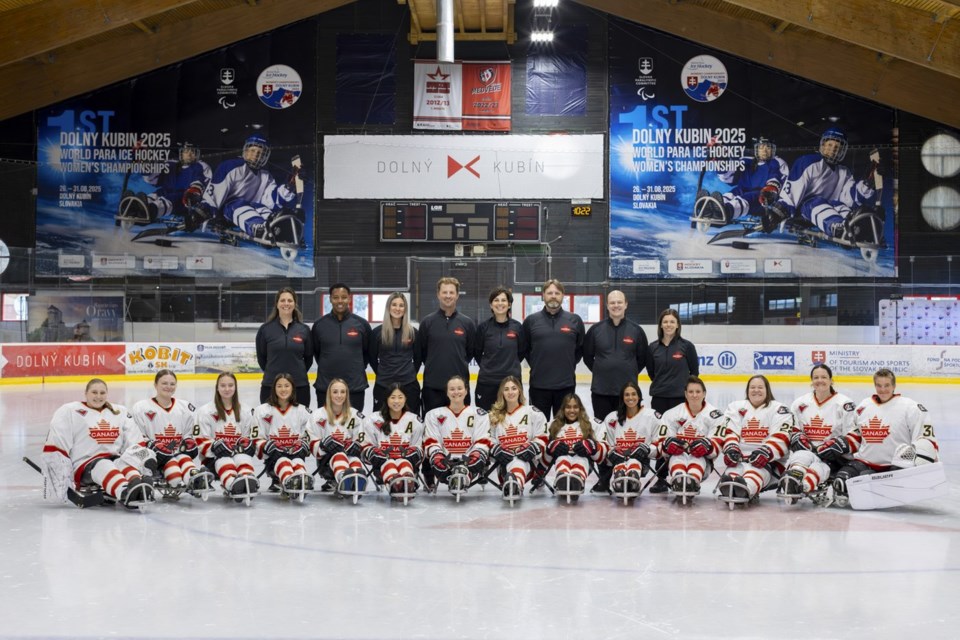Christina Picton remembers arriving at the 2022 Paralympics with a mix of joy and heartache as she took it all in.
A veteran of the Canadian women’s Para hockey team, Picton had always imagined lining up alongside her teammates at the Winter Games. Instead, she made it to Beijing as a nordic skier, because women’s Para hockey remained absent from the Paralympic program.
“A very bittersweet experience,” said Picton, who added skiing to her high-performance resume during the pandemic. “I'd always dreamed of being there, but I dreamt of being there with my women's hockey team.
“An emotional experience rolling up to the Games on that first day and being with really great teammates and surrounded by really lovely people, don't get me wrong, but I always wanted to be there with women's hockey."
This week marks a pivotal milestone toward achieving that dream.
Picton and her Canadian teammates are set to compete in the inaugural Para Ice Hockey Women’s World Championships in Dolny Kubin, Slovakia — a landmark moment on the road to making women’s Para hockey a Paralympic sport by 2030.
The tournament runs from Tuesday through Sunday and features six teams: Canada, the United States, Britain, Australia, Norway and a Team World made up of players from nine countries. Canada opens round-robin play Tuesday against Team World.
Tara Chisholm, Canada’s head coach since 2013, says it’s impossible to underestimate the event’s significance.
“We're not just building our team and program, we're helping to build the history of the women's game,” she said. “These (games) are going to be marked down forever and recorded within the history books of the sport.”
World Para Ice Hockey needs to organize at least two women’s world championships before submitting a proposal to the International Paralympic Committee’s governing board for the 2030 Games. While nothing has been announced, Chisholm said events in 2026 and 2027 are already in the works.
Para hockey at the Paralympics is currently mixed-gender, but only three women — two from Norway, one from China — have ever participated. It’s the main reason why the Winter Games have a pronounced gender gap, with women representing only 24 per cent of 564 athletes in Beijing.
Nations can expand their Para hockey rosters from 17 to 18 players to add a woman. And for years, Canadian star Raphaëlle Tousignant thought that would be her only shot at achieving her Paralympic dream.
“When I started to play Para hockey, I quickly realized that I was not allowed to have the same dream as my fellow guy teammates,” she said. “We were not at the Paralympic Games. There was no world championship.
“Now it's a time that, you know what? It's getting real. Everything is in place for it to happen in 2030, and it's just surreal that it will happen.”
Tousignant became the first woman to play for Canada at a major international competition when she cracked the 2023 world championship roster in Moose Jaw, Sask.
The 23-year-old from Terrebonne, Que. — who still hopes to join the Canadian men at next year’s Paralympics in Milan-Cortina, Italy — said it “means the world” that her female teammates can finally play on the big stage.
“When I got to experience it, one part of me was sad because yes, I did work hard to get there, but I also wished all my teammates would have had that opportunity,” she said. “It's not fair that the men's team and the men's side of the game get everything. They get the Paralympic Games, they get a world championship, they get the funding — and we didn't get anything for years.
“It was time for it to happen.”
As a non-Paralympic sport, women’s Para hockey does not fall under the Hockey Canada umbrella — although the governing body’s foundation is a key sponsor — and the national team does not receive funding from Sport Canada or Own The Podium.
Since the program’s inception in 2007, players have paid thousands annually to travel across the country for training camps and competitions.
That’s starting to change thanks to the world championships. Three months ago, the team thought each player would have to shell out between $5,500 and $6,000 for the tournament, but several corporate sponsors and supporters covered the costs.
“This being a world championships has brought a lot more media and attention,” said the 32-year-old Picton of Fonthill, Ont. “More of corporate Canada has been excited to get behind us, and they understand the gravity of the inaugural world championships in our sport and how hockey in Canada is our bread and butter.”
Picton, a national team member since 2010, remembers the program’s beginnings as all about getting women in sleds together — the finer points of training, nutrition and strategy were secondary.
In her first days as coach, Chisholm recalls a full roster coming out onto the practice ice with mismatched jerseys.
“We were such a ragtag crew,” she said.
These days, players file training logs weekly, hold team calls every two weeks and have a medical doctor, along with a squad of volunteers to help with coaching and management.
“Elevating the program to a world-class level has definitely taken a decade's worth of work,” Chisholm said. “It's very much a world-class program now, and we still have athletes paying their way and volunteers donating their time … but the passion, dedication and level of compete we expect is that of any other program that gets funded."
This report by The Canadian Press was first published Aug. 25, 2025.
Daniel Rainbird, The Canadian Press




